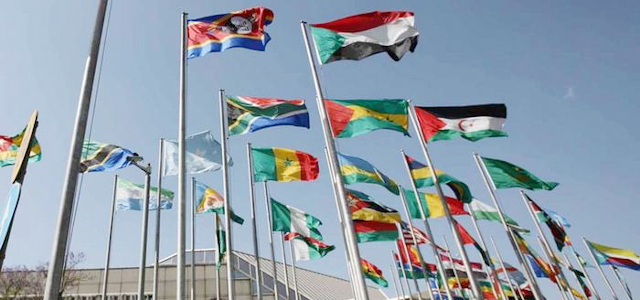The Assembly of the African Union (AU) Heads of State have formally adopted the progressive Continental Africa Water Investment Program (AIP), during its 34th Ordinary Session on 7th February in Addis Ababa, Ethiopia.
The AIP was adopted as part of the second phase of the Africa Union Development Agency’s Programme for Infrastructure Development in Africa Priority Action Plan (PIDA-PAP 2) – a strategic portfolio of projects proposed by Regional Economic Communities and AU Member States for implementation between 2021 and 2030 that is led by the African Union Development Agency (AUDA-NEPAD).
PIDA-PAP 2 is comprised of sixty-nine (69) regional infrastructure projects, of which the AIP is one, in the sectors of Energy, Transport, Trans-Boundary Water, and Information and Communication Technology with an estimated budget of USD $161 billion.
The AIP will accelerate investment into climate-resilient regional, transboundary, and national water infrastructure – such as dams, water transfer systems, irrigation systems, water management information systems, water supply, and sanitation infrastructure – which are critically needed to meet Africa’s growing socio-economic needs.
Over the next ten years, the AIP is expected to leverage and influence US$30 billion in climate resilience Sustainable Development Goal 6 water investments and create at least 5 million jobs. The programme is aligned to the goals of PIDA-PAP 2 to accelerate construction activities, job creation and also boost industrialisation and trade.
“As a continent, we face significant challenges when it comes to securing water for economic development and social needs,” said His Excellency President Jakaya Mrisho Kikwete, who is 4th President of the United Republic of Tanzania, 6th Chairperson of the African Union, and Co-Chair of AIP.
“The AIP directly responds to the urgent obstacles that Africa faces in meeting its future water needs, therefore I am very pleased that it has been adopted by the AU Heads of States at the 34th AU Summit,” added President Kikwete.
AIP addresses massive investment gap for water infrastructure in Africa
Mr. Alex Simalabwi, Executive Secretary and Director of the AIP Support Unit at the Global Water Partnership Southern Africa and Africa Coordination, said that delivery of water infrastructure across Africa remains below targets required to meet the water needs of the continent. The African Development Bank estimates that USD64 billion is required annually to meet the 2025 Africa water vision of water security for all, yet only USD10-19 billion/year is invested in water infrastructure.
“The AIP is designed to address this investment gap, within the context of African economies being under considerable pressure going forward due to Covid-19 economic fall-out and the devastating effects of climate change, which are becoming more frequent and more severe with each passing year,” said Mr. Simalabwi.
Lack of finance and poor project preparation directly addressed
The Continental Africa Water Investment Program will support priority water infrastructure projects, by addressing two significant obstacles facing AU member states: lack of financing and inadequate preparation of bankable projects.
“The programme includes a resource mobilisation strategy which will broker strategic linkages between project owners (the AU Member States) and suitable financiers from both the public and private sectors while providing ongoing facilitation of resource mobilisation through project cycles,” said Dr. Towela Nyirenda-Jere, Head of the Economic Integration Division at the African Union Development Agency (AUDA-NEPAD).
Specifically, the AIP will accelerate access to project finance from the private sector, which historically has not invested widely in African water infrastructure.
“The AIP will focus on knowledge sharing and capacity building of AU Members States. We expect this will make African water projects more attractive to the private sector which is a critical ingredient in the realisation of the Agenda 2063 dream of ‘The Africa We Want’,” said Dr. Paul Orengoh, Director of Programmes at the African Ministers’ Council on Water (AMCOW). In February 2019, AMCOW endorsed the development of the AIP.
Mr. Fred Mwango, Regional Water Expert at the Intergovernmental Authority on Development (IGAD) welcomed the AU’s decision on PIDA-PAP 2 and said this presents an opportunity for countries to invest in water related infrastructure. ‘We have lots of shared water resources that are not yet fully developed for economic and wellbeing of people in the IGAD region. With proper planning and investments in water information and infrastructure, the horn of Africa will be a great place to live’, he said.
Mr. Graham Chingambu, Fund Manager of the Southern Africa Development Community (SADC) Water Fund at the Development Bank of Southern Africa, said: “Strengthening the project preparation process in SADC region will be critical to improving the investment appeal of African water infrastructure projects.’
Mr. Bougonou K. Djeri – Alassani, Head of the Division for Water Governance and Policies at the Economic Community of West African States (ECOWAS) Water Resources Management Centre welcomed the adoption of AIP and said this will accelerate regional cooperation on transboundary water investments to address the challenge related to the preparation of bankable projects and their successful implementation across Africa.
Implementation and next steps
The AIP will target at least 18 countries, starting with five pilot countries; Benin, Cameroon, Uganda, Tunisia, and Zambia and five transboundary basins: North-West Sahara Aquifer System, Volta Basin, Lake Chad Basin, Kagera/Lake Victoria Basin, and Zambezi River Basin.
AIP implementation in the five pilot countries has already commenced with support from the Austrian Development Agency, the Swiss Agency for Development and Cooperation, and the Swedish International Development Cooperation Agency.
Click here to download the Press Release Statement.
Photo credit: Deutsche Welle
